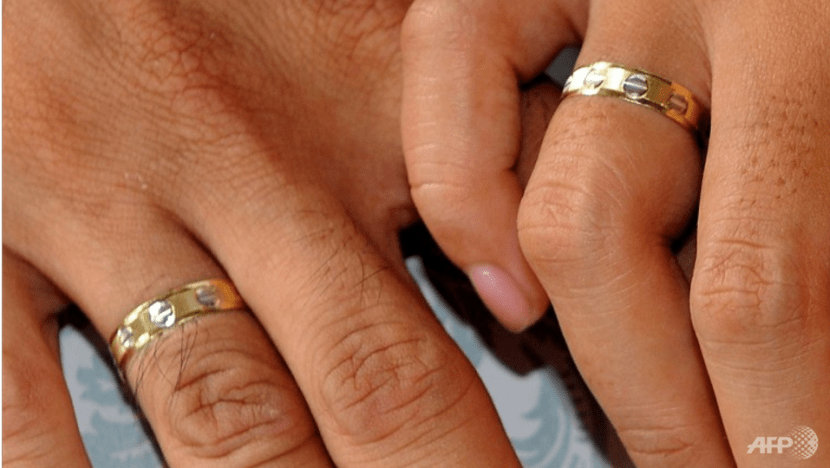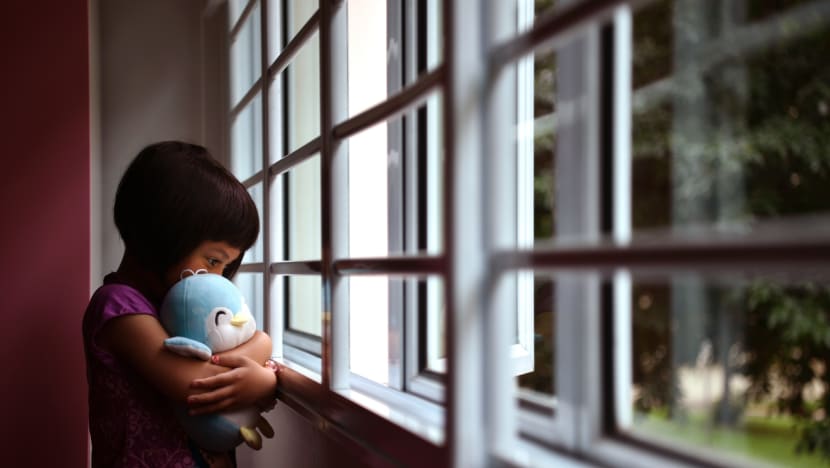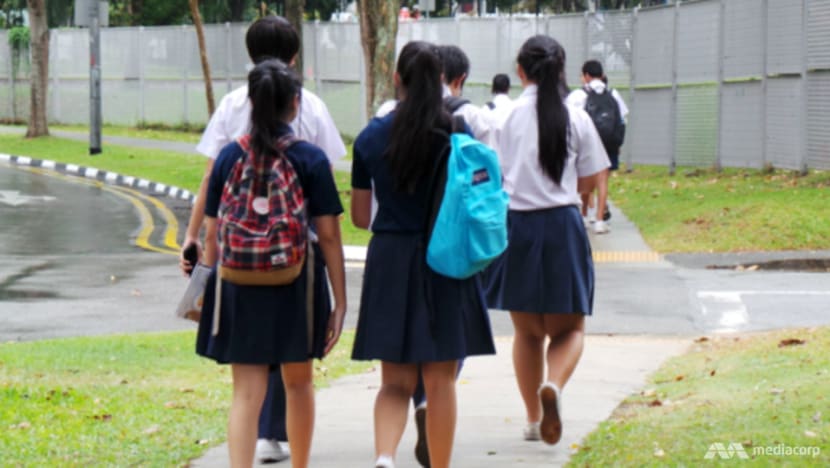IN FOCUS: Should parents divorce or stay together for the kids?
A month after the release of an official study that investigated whether children of divorcees “suffer long-term disadvantages”, CNA looks at the pros and cons of couples staying together for the sake of their sons and daughters.

File photo of wedding rings. (Photo: AFP/Jay Directo)
SINGAPORE: Before Alex’s* parents got divorced, they fought almost every day. Sometimes, the fights would even escalate physically, with her mother inflicting self-harm by hitting herself and punching walls.
“It was terribly disruptive and scary as a young child to see my parents fight,” she told CNA. “The air in the room would always get so tense and my sibling and I would try to hide and make sure we did not do anything to anger my mum for the rest of the day (as) we were worried that we would be on the end of the hitting.”
The fights were often over their different personalities and values. While her mother was ambitious, her father was relaxed and easy-going, and did not prioritise climbing the social ladder, Alex said.
She first heard from her father when she was about eight years old that he did not see the marriage working out. “I was hurt at first. Confused as to why my parents had to divorce while I had friends whose parents tried to make it work.”
But then, even as a child, she did have moments where she wondered if it was better for her parents to get divorced.
“When I was nine, I told my mum to get a divorce,” she said. “She was shocked for me to say that, but I think she also felt relieved.”
When her parents finally separated three years later, Alex said that she realised “how toxic and unhealthy their relationship was”, and she became "happy" that her parents separated.
But the divorce came with its own set of challenges. After going their separate ways, Alex’s parents barely talked to each other. They avoided each other as much as possible and relied on her to be their go-between. “I had to go to the other parent and say, mum or dad wanted me to tell you … All the time.”

As she did not have good role models of a “healthy and functional relationship”, Alex found that she picked up some of her parents’ behaviour, like using abusive language on her partners.
“I spend a lot of time to identify and unlearn these abusive behaviours, such as communicating my needs and expectations rather than just assuming my partner should know it,” she said.
LONG-TERM DISADVANTAGES FOR CHILDREN FROM DIVORCED FAMILIES
In December, the Ministry of Social and Family Development (MSF) released its first local study on whether children of divorcees “suffer long-term disadvantages”, and if so, the extent of these disadvantages.
The study looked at the economic and marriage outcomes of about 9,000 Singaporeans with divorced parents, at the point when they turned 35 years old.
To ensure that the study compared families of “similar profiles”, researchers matched children of divorced families with children of intact families on a “range of demographic characteristics”, such as gender, year of birth, parents’ age and highest qualifications attained at the point of marriage. However, it did not account for “unobservable attributes” such as the family environment.
“While the results might not strictly inform us of the causal impact of divorce, they provide an indicative sense of children’s long-term outcomes associated with parental divorce, which would in turn help inform interventions for children when couples file for divorce,” researchers wrote.
Overall, the study found that children from divorced families were less likely to obtain a university degree, earned less, had lower Central Provident Fund (CPF) balances, were less likely to marry and were more likely to divorce among those who were married.
READ: More couples seek counselling as circuit breaker, working from home put strain on marriages
Said Minister for Social and Family Development Masagos Zulkifli: “With this landmark study, we now know that the effects of divorce on a child are not temporary, and impact the child’s future, his education and his family when he marries. This is why post-divorce, positive co-parenting is so important.”
“At the same time, all of us can play our part. If we know someone whose marriage is suffering, do reach out and encourage him or her to seek help early. We may not only save that marriage but also change the life of a child, for the better,” he added.
The study drew criticism from the Association of Women for Action and Research (AWARE). It said in a Facebook post on Dec 11 that it was “concerned” that the study’s methodology “masks important subtleties in strength of family ties, income and others that may contribute to these outcomes”.
“As the study stands, it makes a claim of strong correlation between divorce and the seemingly negative outcomes for children, without considering other factors that may undermine its claim,” AWARE wrote, adding that factors could include the strength and quality of family ties, income status of parents and whether the children were exposed to a stable housing environment in their childhood.
The association added that it would be a “grave disservice” to parents and children if Singapore made getting divorces harder on the basis of the study.
In Parliament on Jan 4, Second Minister for Education Maliki Osman also addressed schools’ support for children of divorced families, noting that schools monitor students affected by divorce and other issues “closely” and provide social, emotional and learning support if needed.
“When the school is informed of a change in parents’ marital status by either the parents or the students, teachers will check in with the students and assess the needs to decide what support is appropriate and necessary,” he said.
DOES THE “DIVORCE PENALTY” EXIST?
Sam*, whose parents divorced after he became an adult, said that his parents' relationship had always been “lukewarm”. While his father did not seem to care, he felt that his mother tried to stay in the marriage for the sake of the children.
However, a series of miscommunications built up conflict over the years, which escalated to physical violence. It was then that Sam’s parents decided to end their marriage of more than 30 years.
Even though the divorce happened when he was an adult, Sam still felt that their relationship and the eventual split made him more critical of relationships and more cautious of marriage.
“I feel that either way, a divorce is a painful experience for the kids,” he said. “The pain is still there, despite whether it happens in infancy or when they are adults.”
He added that adults are more likely to understand what is going on and the social and economic consequences of parents’ breaking up.
“I hence feel that there really isn't a difference, the pain is the same. But if it were me, I’d still want a divorce to take place when the kids are adults, because by then the kids would know how to take care of themselves. And even if it affects them, they won’t be physically left with zero support,” he said.
Counsellors said that proper and peaceful co-parenting after a divorce is the best way to manage any potential long-term mental and emotional issues for children.
Chief wellbeing officer of the Singapore Counselling Centre John Shepherd Lim said that children are affected mentally and emotionally if they do not adjust to the divorce well. This could impact the way they respond to social situations and conflicts growing up.
In families where parents quarrel frequently, whether they are together or divorced is “poor role-modelling” and could cause children to become “equally abrasive” or “conflict-avoidant” where they believe that all conflicts are "bad".
The child could also develop “low confidence” in marriage, affecting how they manage future romantic relationships.
In addition, conflict could take attention away from the child, and they find themselves “lacking in nurturance and support”, he said.
READ: Fewer marriages, more divorces in Singapore last year
“The above can be mitigated but requires a high level of self-awareness and commitment of both parents to ensure that the child adjusts well to the divorce," said Mr Lim.
Parents who feel ill-equipped to help their children cope should tap MSF's programmes and provide their children with professional counselling support, he added.
He noted that co-parenting has been “proven” to be an effective arrangement for parents “emotionally mature enough” to keep the peace in front of their children and grow to manage their emotions well.
“Both parents must be committed to still play parenting roles in the child’s life; where both parents focus on moving forward as individuals while giving of their best selves to the child,” he said.
Dr Tracie Lazaroo, a clinical psychologist at Inner Light Psychological Services and LP Clinic, said she does not believe the “divorce penalty” exists.
“(The divorce penalty) largely depends on the stigma perpetuated by society and the extent in which the stigma is projected onto those within the divorce,” she said.
“Children are inherently resilient and can be correctly supported and taught to excel and despite earlier circumstances. They also tend to bounce back from adversity much quicker than adults.”
She suggested that most issues surrounding a “divorce penalty” is due to parents' poor knowledge of how to care for themselves and their children post-divorce, which can be managed once learned.
READ: Commentary: Couples who stay in unhappy unions for the sake of children may end up harming them
Individual differences of the person and family matter as well, she added.
“There are many systemic and environmental factors that can cause a child to not succeed in life; divorce is not the sole psychosocial stressor,” she said, adding that these could include chronic illness or having to manage “significant financial difficulties”.
On minimising the effect of the “divorce penalty” on children, MSF said: “Divorce only dissolves the marital relationship, not the parent-child relationship.”
While the outcomes of children with divorced parents “were on average worse” compared to children whose parents remained married, “this does not necessarily mean that all children will have the same outcomes”, the ministry's spokesperson told CNA.
“These outcomes can be mitigated with effective co-parenting and strong support from the extended family and community.”
WHEN SHOULD PARENTS GET DIVORCED?
While divorce could have a negative impact on children, there are cases which might make divorce a better option, said Dr Lazaroo.
Those in emotionally and physically abusive relationships should consider divorce, she said. This also applies to cases where one or more parties “weaponises or uses children as collateral in any way”, such as making them messengers between parents or asking leading questions to create doubt and guilt in themselves or the other parent.
Chronic substance abuse could be another reason for parents to divorce, said Mr Lim, as “the child is usually also deprived as a result of heavy financial debts and poor care”.
In less severe situations, like constant disagreements and fights from “fundamental differences in personalities and values”, couples should consider the ages of their children and the duration of which the conflicts have been happening, he said.
“Divorce should never be finalised in a fit of anger. However, it is also important to note that constant marital conflict can be equally stressful and unhealthy for a child’s development,” said Mr Lim.
“If counselling has been sought and either one or both parties show consistent unwillingness to improve the relationship, co-parenting might be an option to consider, where parents continue being a part of the child’s life while they live separately.”

Parents who choose to stay together will have to navigate “complexities which can be novel and numerous”, said Dr Lazaroo. “However, it is not impossible.”
“It is better for parents to stay together when most of the needs of all parties involved (children and spouses) can be met and equally considered. This is also true if both have the capacity to love and support their partners through difficult times and approach issues as a union,” she added.
While heated disagreements may be unavoidable in any long-term relationship, the way partners resolve the disagreements matter. They should treat each other with mutual respect, patience and kindness, said Dr Lazaroo.
If partners feel that an event or action constitutes a “marriage deal-breaker”, it is up to them to state their expectations and decide if it is something they can reconcile and forgive or move forward with.
“Leaving these important incidents unresolved can increase the potential for similar instances to reoccur in future, therefore couples should consider staying together if they are mutually willing to compromise,” she said.
It is important to note that many things can be worked through, even if it may not seem like the case initially, said Mr Lim.
When couples find themselves fighting over the same thing again and again, or when one or both of them are “caught in behavioural patterns that repeat themselves”, they should look to counselling as an option before divorce, he said.
This is because divorce could have “far-reaching negative impacts” on their children, especially those aged six to 12 who “might not fully understand the complexities of the decision made but yet are old enough to experience and understand feelings of abandonment, pain, and loss”.
Another reason is that repeated behaviours have “deeper emotional and psychological roots” that individuals should deal with through counselling.
“In fact, it is a common sentiment for couples to realise that the issues which they once deemed to be unresolvable can be worked through with the help of experienced counsellors,” he said.
However, he noted that the effectiveness of counselling is “highly dependent” on the couple’s willingness to be vulnerable with each other and work through their differences, and the individuals’ willingness to change.
HOW THE GOVERNMENT SUPPORTS FAMILIES GOING THROUGH DIVORCE
In response to CNA’s queries, MSF said it is not for the ministry to suggest circumstances or situations where it might be better for couples to divorce.
“We respect the decision of each couple, but together with the DSSAs (Divorce Support Specialist Agencies) and other social service agencies, we aim to support those who wish to reconcile and those who decide to divorce,” its spokesperson said.
The Women’s Charter mandates that couples with minor children who “cannot agree on divorce or its ancillary matters” attend the Mandatory Parenting Programme before filing for divorce, noted the spokesperson.
Those who can agree on divorce or its ancillary matters attend the Parenting Pact when their divorce is concluded.
As for Muslim couples, they have to go through counselling and parenting programmes as part of the divorce process at the Syariah Court.
Couples considering divorce may also make use of a new online counselling pilot with the Community Psychology Hub, or approach any of the 215 trained Marital First Responders in the community. The Marital First Responders are equipped to provide basic marriage support to couples facing marital issues, the spokesperson said.
The Mandatory Parenting Programme, which is facilitated by the DSSAs, helps parents “gain knowledge and insights” on the divorce will affect their children and themselves in areas including financial, psychosocial or emotional, said Ms Cathy Ding, manager at Thrive Parenting!, a DSSA under AMKFSC Community Services Ltd.
For instance, parents will learn how to discuss their divorce with their children in “an age-appropriate and consistent manner”, and “avoid asking their children to make tough decisions over their future living or visitation arrangement which might lead to loyalty conflict in children”, she said.
READ: Online portal to be set up to provide early support to couples considering divorce
As for children of divorce, the DSSAs provide counselling and the Children-in-Between (CiB) programme. The CiB is a “groupwork programme” that provides “a space for children to feel safe when sharing their experiences and talking about what is going on at home, particularly about how they have been exposed to and caught in between their parents’ arguments”.
“They learn to be more in touch with their feelings and learn ways to express themselves to their parents. Children are also taught how to develop positive thinking and assertion skills to avoid being triangulated in their parents’ conflicts,” said Ms Ding.
The DSSAs support about 6,000 to 8,000 families per year, said MSF's spokesperson.
In the Family Justice Court, a child’s wellbeing is “of paramount concern”, said a spokesperson for the Court.
Divorcing parents who have at least one child below the age of 21 years and have disputes concerning their children are required by law to attend counselling and mediation as part of their divorce proceedings, the spokesperson said.
Those unable to reach an amicable outcome will go through a trial. In each case, a judge may appoint a Child Representative, a trained professional who can “understand and present the child’s best interests to the Court” to help the Court reach a decision on the child’s arrangements.
“A Child Representative represents the voice of the child, providing an independent view of the child’s issues and presenting an objective assessment of the arrangements which are in the best interests of the child,” the spokesperson said.
In addition, the Court could appoint a Parenting Coordinator, to help separated and divorced parents “learn to co-parent effectively”.
“A Parenting Coordinator works directly with the parents to facilitate communication and assist them in resolving disagreements arising from custody and access orders. A Parenting Coordinator also helps parents implement the parenting plan contained in the court orders (eg, orders relating to child access),” said the spokesperson.
“Thus, by helping parents communicate with one another to find ways to resolve parental disputes or disagreements through consensus instead of bringing the conflict back to Court, the Parenting Coordinator minimises the need for parents to regularly attend Court for new orders, among other things. With time, the goal is to have the parents co-parent and resolve conflicts on their own.”
HOW TO HELP CHILDREN ADJUST TO A DIVORCE
Parents play a “pivotal role” in helping children adjust to a divorce, said Mr Lim.
“How parents themselves react and adjust to the divorce affect the way the children adjust - they look towards the parents for assurance and signs that they can get through this together," he said.
“It is important for parents to help the child feel safe, secure and loved throughout the process.”
In the process of a divorce, younger children may learn that both parents do not love each other anymore and fear that the parents do not love them too, said Mr Lim. Older children may be angry at the parents for breaking up the family or blame themselves for the divorce.
“Parents can offer support to the children by letting them vocalise their thoughts and feelings, and having open and honest conversations with them,” he said.
Minimising disruptions to the children’s daily routine would help give them a “sense of security, control and stability”, as they cope with the changes at home, he added.
Meanwhile, parents should remain civil to each other and keep conflict, tension, negativity and blame away from the children, he said.
If there is more than one child in the household, parents should not show bias when each child shows different methods of coping.
“When parents separate, children may find that they have lost a parent, which is why effective co-parenting is a great way to help children adjust to a divorce," said Mr Lim.
“Co-parenting does not simply mean that parents take turns to spend time with the child. Having an active role in the child’s daily lives ensures that their needs are met and retains close relationships with both parents."
For effective co-parenting, parents will have to separate their personal relationship from the co-parenting relationship, he added.
"No matter how bad the divorce was, parents should make shared decisions when it comes to their child and communicate with each other so that the child will feel confident of the love of both parents and will be able to adjust more quickly to new living conditions."
Ultimately, said Alex, after experiencing the break down of her parents’ marriage and their subsequent divorce, she believes that couples should only stay together if they respect each other, and do not bring out the other’s worst qualities.
“There are definitely material and financial benefits to having parents staying together, but do these benefits come at an emotional and mental cost for both the parents and for the kids long-term?" she said.
“I think children know that their parents are staying for them in general. I think parents should consider how they are going to raise functional, respectful and emotionally mature children in general. Whether they do that, married or divorced, depends on their relationship and circumstances."
*Names have been changed to protect privacy.














